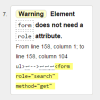
Not on the form. Noted.

Not on the form. Noted.

Experiments in radio and checkbox resizing. It’s a sad state of affairs. The small hit targets are why I recommend adding negative margins above and below the label, coupled with equal padding top and bottom. It’s a recommendation from my forms talk that I will write up soon.
A cheeky fictional conversation about progressive enhancement, though I might take it a bit further: If you want to edit the rich document and JavaScript enhancements aren’t available, there’s always Markdown or Textile or any other plain text pseudo-formatting language. Where there’s a will…

This is a fantastic overview of the accessibility considerations you should be making. Most are far more important than screen reader support.
New ES6 (ECMAScript 2015) features rolling out in V8: spread and new.target. Also: Reduced jank.
Jen Simmons and I discuss working on the web and all things progressive enhancement.
I had the great pleasure of seeing Dave present his accessible breakout game at the MS Edge Web Summit and have been eagerly awaiting this post ever since. So much good stuff in here!

An excellent round-up of research findings and articles with regard to accessibility and the infinite scrolling design pattern.
This is a fantastic resource for information on how different markup patterns are handled in terms of accessibility.
The fine folks at 18F just posted a beautiful write-up of the talk on progressive enhancement that I delivered as part of the 18F Design Speaker Series. I thoroughly enjoyed talking to the folks that came. They presented some interesting challenges and asked pressing questions—exactly the kind of engagement I love.